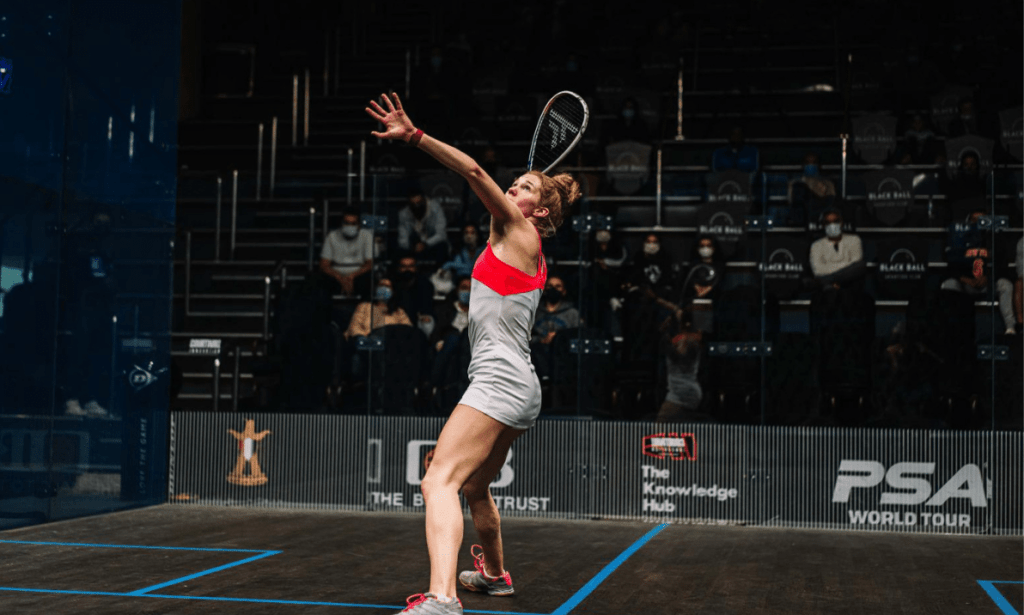Egyptian squash players have been making headlines on the global platform over and over throughout the past several years. In the midst of all these major achievements, Canada’s 2nd best squash player is currently embarking on a journey to learn from Egypt’s leading squash status. Arriving with passion and aspiration, meet professional squash player Danielle Letourneau, coming all the way from Canada to train in Egypt!
Running after her firm devotion to the sport since she was just six years old, Danielle comes from a family of squash players, and currently ranks 26th place on the world stage of professional squash. Graduating from Cornell University in 2015, Danielle soon after joined the Professional Squash Association (PSA) full time. Intrigued by her skill set, we sat down with the avid athlete to learn more about her background, and why Egypt became her choice for growing in professional squash.
Is squash more of your passion since childhood or was this more of a family career?
I wouldn’t say family career, but my whole family including grandparents, parents, some uncles and cousins play for fun. My brother played competitively throughout juniors, went to Princeton University where he played on the varsity team. After graduating he played professionally on the PSA World Tour and represented Canada at the Men’s World Team Championships. He has always been a huge role model to me and has helped me pursue a similar path.
Has there been a specific time that you remember in your career that served as a turning point for you?
I’ve had a few moments that have changed my career, but the most notable was last March when I won both the Calgary Open 20K and the Queen City Open 20K events. In fall of 2019, I spent two months training in Egypt and was making large changes to my game. However, up until March, I still wasn’t getting the results I wanted. In the Calgary tournament, I played some tough matches in the early rounds. In the final I was down 2-0 to Julianne Courtice who is a player who I had consistently lost to 3-0. However, I fought back and won the title 3-2. This match gave me a lot of confidence and also taught me how to push myself the extra mile. The confidence and momentum helped push me through the Queen City Open the following week to win another title. These two weeks showed me that I was doing the right training and that I was on the right path forward.
Would you consider this not only as a turning point, but also as a humbling moment to you?
Before these two weeks, I was struggling mentally to relax and have confidence in my game because I kept wanting to prove to myself that I could do better and be better, but after winning it calmed me down and let me be able to say ok, I’m actually winning these titles, I can relax a little bit, I’m on the right path, and now it’s just easier to trust it and keep going.
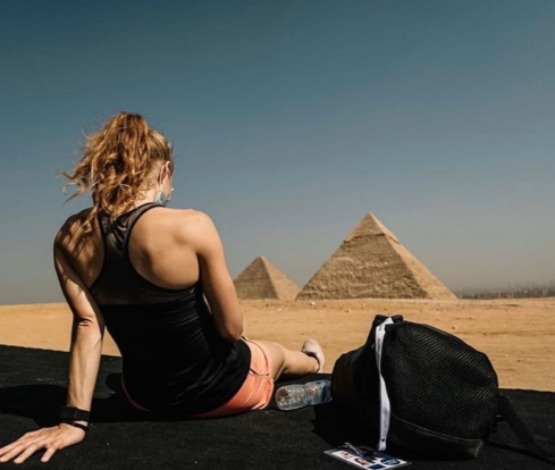
How did your squash career end up leading you to Egypt eventually?
When I first came on tour, I did really well at at the beginning in the smaller events, winning two titles. Then I started competing in the larger events, but after a couple years, I wasn’t moving past the first or second rounds and felt I reached a standstill. Fortunately, while on tour, I met Karim Aly Fathi, who is an Egyptian player has a career high ranking of #33 and who won 2 British Junior Open titles. He gave me some advice with my squash and mentioned that it would be worth trying the training in Egypt. So, leading up to the 2019 World Championships, I was just going to train for 10 days before the event, play the tournament, then go to England to play league matches. However, my visa didn’t work out, so he suggested I stay until the Hong Kong Open. Two months later, the Hong Kong Open was cancelled so I stayed a little longer. So, I ended up staying and training here kind of on a fluke and it worked out. I planned on coming back here in March, and then the lockdown happened, so once things opened up I just decided to fly over.
So you knew this coach back in Canada?
I knew Karim through the PSA Tour. He was playing and we had always gotten along, and he’d give me tips here and there. Then, during the first few months of COVID-19, he ended up making the decision to retire. He was just kind of giving me tips beforehand while he was just playing, and once he retired I figured I’d work with him full time. The first time I came here was a few years ago.
How does your training here differ from back in Canada?
It’s a lot more structured here. Most of my training partners back in Calgary are working full time, so getting the consistency of hits was hard at times. But here, since there are more players I’m able to play more practice matches with a larger variety of styles. One of the biggest changes since moving here has been the emphasis on movement both in my sessions with Karim, but also through movement fitness sessions with Samir Hesham El-Degwi. I work with him 3 times a week and it’s made a huge difference.
Are there any specific Egyptian squash icons that you have?
Raneem El Welily. She recently retired, but the way she plays is just beautiful. She floats around the court and hits amazing shots— it’s very exciting to watch! But more importantly, she’s a great person on and off the court.
Is there a certain intensity that you like in her playing?
It’s funny, because the pace she plays at is intense, but she always looks so relaxed when she plays. She is fierce and will fight for every point, but she looks at ease while she’s doing it— she makes it look easy. When you get on court with her, you’re under so much pressure but at the same time feel like you are able to stay in the rally and get into some sort of rhythm, but the moment you make a mistake or play a bad shot, she takes advantage of it and will hit a winner. Another icon on the women’s side would be Nour El Sherbini. I played her at the CIB Egyptian Open in front of the pyramids and she chopped me! I made it into my 3rd round for the first time at a platinum event and had two good wins leading up to it. I was feeling really good, but once I was on court with her it was a whole new level. She is so talented and so smart— I had no idea where the ball was going half of the time. It was an incredible experience playing her, but I wish it lasted longer. On the men’s side, I really admire Mohammed El Shorbagy, #2 in the World, for his tough mentality, and dynamic style. I really enjoy watching him play. But the thing I really appreciate is that, this year he agreed to mentor me. He has helped me improve my mental game in competition enormously.
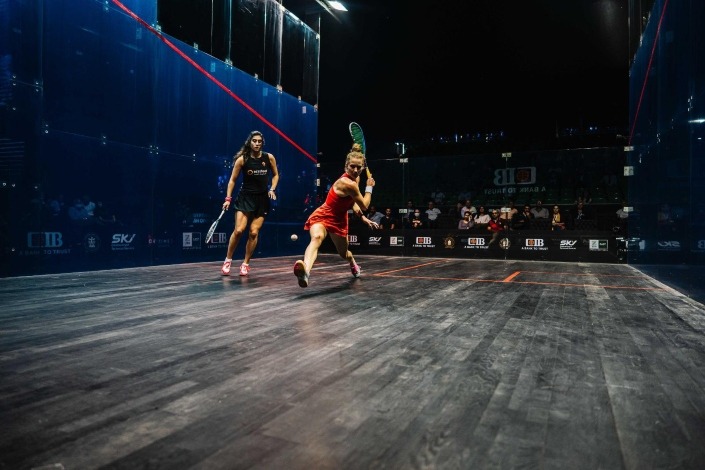
Would you be able to communicate with El Sherbini and have a different dynamic relationship with her off court?
Of course. She is very friendly and nice to talk to. Even when we were going to practice together, we talked the entire drive to the club. Obviously, when she steps on court, she is all business.
Why do you think Egypt doesn’t broadcast squash tournaments as much as they would with football?
I guess it’s because football is a sport that is easily accessible and easy to watch and understand. I hope there will be more squash on TV in the future!
Are there any specific Egyptian meals that you would fuel up on prior to a match or training, or even like to celebrate with?
I love Kofta, mahshy— especially the vine leaves one— and all of the Egyptian desserts. My favorite is Aish-as-Saraya. I wouldn’t say I would fuel up on these before a match, but they’re delicious and a nice treat after training.
So would you have this before a match?
Probably not. I think the closest thing I’d have before a match would be Shish-Tawook with rice. I’d have that or pasta with red sauce. Both are simple and get the job done, but when I think of pasta and red sauce I feel it’s more of an everywhere meal and not necessarily an Egyptian dish. For protein, I’d probably just have any type of meat, though I’ll admit I don’t enjoy the liver here. There was only one day I had it where I really enjoyed it and it was at El Brince. Before a morning workout, I’ll happily have fuul.
Up till now, are there any highlights or memories either in or out of squash in Egypt?
Definitely playing in front of the pyramids. It was such a special experience and one I will never forget. But my most memorable non squash related activities have been riding a camel at the pyramids, and spending a few weekends at the North Coast this summer. The whole experience of going to the pyramids, negotiating a price to ride the camel, getting the guide to tell us stories about Egypt, and taking in the grandness of the pyramids was a lot of fun. The North Coast has the most amazing beach I’ve ever been to with spectacular water. It was really nice to get out of the city, soak up the sun, and relax.
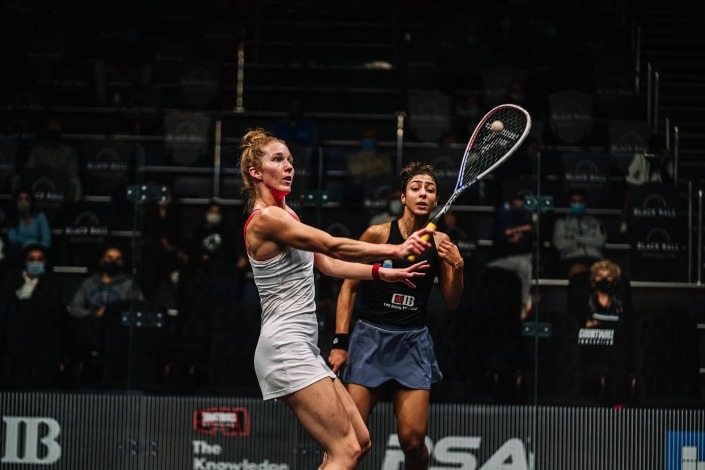
So when are you leaving Egypt?
I don’t know yet. I thought about going home for Christmas originally, but with the changing quarantine rules I was unsure if I’d be able to fly back out of Canada. It didn’t seem worth it to fly home because I would have two weeks of quarantine, and because of the strict lockdown, I wouldn’t be able to see my friends or extended family. So I decided to stay in Egypt. Right now there is a tournament coming up in March, it’s called the Black Ball Open, and it will be in New Cairo. After this tournament, the provisional calendar PSA has discussed looks like there will be more tournaments happening all the way through to July. Afterwards, the tour will start up again. Right now my stay is open ended.
What would you hope to gain from the experience here to use eventually abroad? Is there something specific the trainers here offer you?
I think because there have been generations of good players here, they have passed down a lot of knowledge to younger players and coaches over time. There are some nuances to the game that those top players know, and knowledge that I am now learning for the first time. I think eventually, it would be great to pass along the information I am learning to players back in Canada so that we can improve. It’s also interesting to see how programs are structured here compared to back home, and learning how this structure can be applied in other places so that we can have increased participation. One of the issues right now in western countries is that we are either losing participation in squash relative to other sports or squash centers are struggling to survive, but here in Egypt people are continuously looking to start academies and new programs. In Canada and the US squash can be seen as an elitist sport because access to courts is difficult unless you’re a member of a private club. At these clubs, there are a limited amount of junior players and they are all being pulled to participate in various sports. As a result, we have fewer juniors playing. However, on the plus side, there is a larger adult squash where there are more leagues and tournaments for senior players. So, ideally it would be great to create a combination of high performance as well as continued involvement. Overall, I hope to take the knowledge from here to help grow the sport I love.
Considering what you said earlier, why do you think some would consider squash as an elitist sport?
I think it’s just because squash is played in private clubs. While there are some public clubs, it might be harder to get the same access to top coaches or quality training. People will be able to play for fun, but might not be able to reach a high level.
Here it would probably be mainly tennis that would be equivalent in those terms, say for example like in clubs in Gouna.
I can’t speak in terms of tennis, since I don’t know the clubs for it. I do love Gouna though! There is a tournament in Gouna every year, founded by Amr Mansi. He does an amazing job of promoting this event and normally hosts it around April or May. It’s one of my favorite events and places to go.
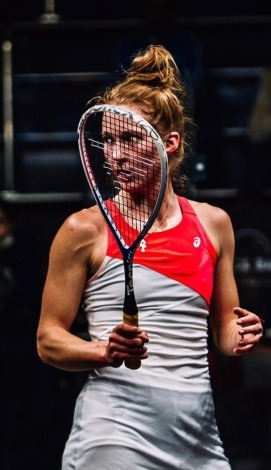
Considering your career, would you settle somewhere else or is it too scattered for you?
I’m settling here for a few years. It seems I’ll stay here until I decide to retire as it’s been a great fit so far. I’d love to go back to Calgary once I retire, but it all depends on jobs and opportunities. I am interested in a variety of career paths so I will take some time to see what works best for me. Right now I’m debating whether to go back to school and get another degree or if I want to start work right away. I don’t think I will go into coaching full time, but I will definitely stay involved in squash throughout my life in some capacity.
What’s a late age for retiring or considered old for squash?
It all depends on the person and how his or her body is holding up. I’d say on average, women tend to retire around 33, and for the men closer to 36. Obviously there is a little more pressure on women to retire earlier if they want to start a family. For me, I have lots of energy and determination to keep giving to my squash career. The training here is difficult and there are times where I need to take some time off to reset and create a balanced life here, but overall I love the grind and I love pushing myself to be the best player I can be.


